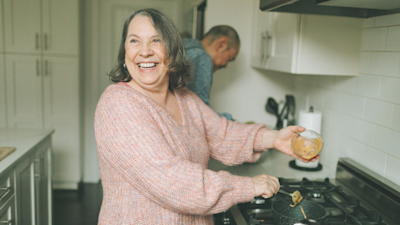Transitional aged care program participant Wayne has made big changes, and now looks forward to seeing what else his life holds.

Image: An older man wearing a navy blue cardigan and a light blue shirt sits on a grey couch in a lounge room, smiling at the camera with his hands on a walking stick.
Warning, this story references alcohol consumption. If you need support, please reach out to your local service. If you are in South Australia, visit our Alcohol and other drugs counselling webpage to learn more about our services.
Everyone has their own unique story to tell - today, meet Wayne.
Wayne was unsteady on his feet when he first met Amanda, his Life Without Barriers Community Linker. He had just returned from five weeks in hospital due to multiple falls.
“I couldn’t do things because I was in so much pain. I was at a low point, feeling very down about myself and my life. I didn’t think I could change my situation. I felt no hope for improvement,” said Wayne.
Wayne came to Life Without Barriers as part of the Transitional Aged Care program. Life Without Barriers worked in partnership with NSW Health to give Wayne the support he needed to recover at home and regain his independence.
As well as giving Wayne practical help with every day tasks such as grocery shopping and transport, Life Without Barriers also supported Wayne by learning what was important to him and helping him independently achieve his goals.
Wayne is separated from his wife, Chris, but is still good friends with her. Chris regularly helped Wayne with his housework, laundry, and shopping, but due to Wayne’s increasing lack of mobility, more support was needed.
When Amanda asked Wayne what his goals were, he said,
“I want to improve my mobility. Be in control of my own destiny."
"I want to get sorted in my own place. Be able to do more things for myself and take the load off Chris, and I do not want to be bored anymore. Boredom is the main reason I drink alcohol.”
Supported by Life Without Barriers and NSW Health, Wayne started to make changes to achieve his goals. He began accepting outside help. He stopped drinking alcohol and now drinks zero-alcohol beer instead.
Wayne was given the space to become more independent and started to do things for himself, like his own cooking and cleaning. As Wayne proved to himself what he was capable of, his confidence grew. After a few weeks of working with Wayne, Amanda started to notice changes.
“He stood taller, his tone of voice changed, he remembered things better, and our conversations were much clearer. He talked more about his goals and was coming up with new ones,” said Amanda.
Before he retired, Wayne worked as an electrician. He had an active social life and was the head of three clubs. He played a lot of sports, including tennis, golf and cricket. As he got older, Wayne’s physical condition changed. He stopped being so active, which led to his sense of boredom and isolation.
Talking with Amanda, Wayne realised he needed to be engaged in his community again. Wayne got a mobility scooter, which gave him the independence to do more of the things he used to do.
He started to visit friends again and go into town and chat with people along the way. He felt more comfortable in social settings than he had been in a long time.
Wayne recently went to a Men’s Shed and knew nearly all the men there. Although he could not get as hands-on as he would have liked during the day, the former electrician dispensed advice about how to make furniture.
“I knew how to do things, but could not do them,” he said.
Wayne enjoyed spending time with his old mates and acknowledged that the group could benefit from his experience. When asked if he would return to the Men’s Shed, Wayne coyly said, “I might go back for a visit.”
Amanda paid Wayne a visit recently and was struck by how much Wayne had changed in the time she had known him. Wayne showed her how he could walk to get his mail.
“Wayne could hardly stand before. Now he walks - even his physical appearance has changed. He looks younger, stands taller and appears to be a more confident person,” said Amanda.
Best of all has been the change in Wayne’s outlook.
“With everyone’s support, Wayne was able to see his capability. Now he’s not so focused on the barriers, but instead on what he can do and is going to do next,” said Amanda.
Wayne feels good about where his life is headed.
“I am 65, and I was down about the rest of my life."
"Now, I am actually looking forward to what else it holds.”
A person's story is precious. We take storytelling seriously. Sometimes people are able to tell their own story, and we love that. We always make sure they give us their ok, and we will always honour the trust placed in us to bring their story forward.


